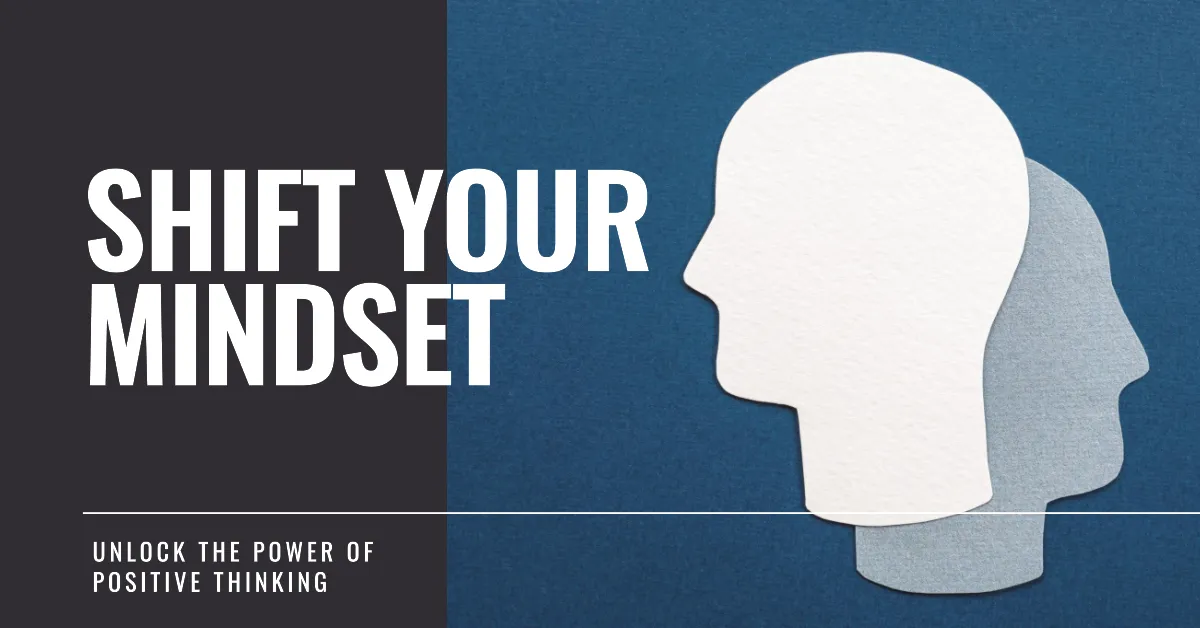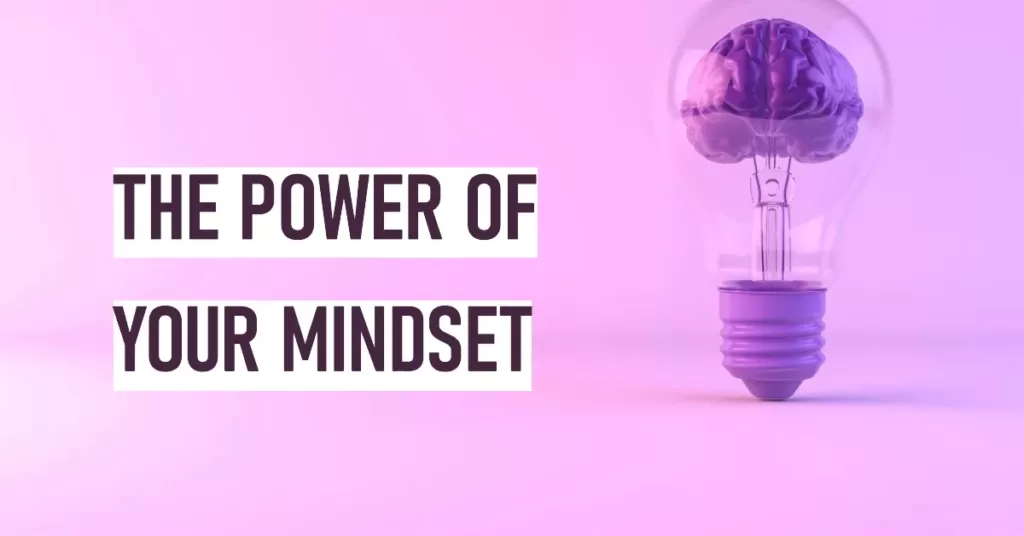Do you ever wonder where your mindset comes from? Why do you approach certain situations with a positive attitude, while others fill you with doubt and negativity? The truth is that your mindset is shaped by a variety of factors – some within your control, and others outside of it. Understanding the origins of your mindset can be the first step toward creating a more fulfilling life.
Your mindset refers to the way you perceive and respond to the world around you. It influences how you interpret events, make decisions, and interact with others. While it may seem like an inherent part of who you are, your mindset is actually shaped by a complex interplay of nature and nurture – genetic factors that influence personality traits and behaviors, as well as environmental factors such as family upbringing, cultural influences, experiences, and trauma. By exploring the various sources of your mindset, you can gain deeper insight into yourself and learn how to shape your thoughts in a way that empowers rather than limits you.
Table of Contents
Key Takeaways
- Your mindset is shaped by a combination of genetics, upbringing, culture, experiences, and trauma;
- Factors such as upbringing, education, culture, experiences, and relationships can influence your mindset, either limiting or expanding your potential;
- Childhood experiences can shape our view of ourselves and others, with positive experiences building resilience and fostering a positive outlook on life;
- Regardless of past experiences or upbringing, you have the power to change your mindset through practice.
Definition of Mindset
Let’s dive into the definition of mindset and figure out what it really means! Your mindset is essentially your attitude, beliefs, and values toward yourself and the world around you. It shapes how you perceive situations and influences your behavior. Your mindset can either limit or expand your potential. Simply put, it is the lens through which you view life.
Your mindset can be influenced by a variety of factors such as upbringing, education, culture, experiences, and relationships. For instance, if you were raised in an environment where failure was perceived as unacceptable or shameful, you may develop a fixed mindset that avoids risks and challenges to avoid failure. On the other hand, if you had parents who encouraged growth and learning from mistakes, you may develop a growth mindset that embraces challenges as opportunities for growth.
The good news is that regardless of your past experiences or upbringing, you have the power to change your mindset. It takes effort to rewire negative thought patterns or limiting beliefs but with practice and patience, it is possible. You can start by becoming aware of your thoughts and questioning their validity. Are they based on facts or assumptions? Are they helping or hindering your progress? By challenging negative thoughts with positive affirmations or reframing them in a more helpful way, over time you can create new neural pathways that support a more positive outlook.
Understanding the meaning of mindset is crucial in order to cultivate one that empowers rather than hinders us. Knowing that we have control over our attitudes toward ourselves and life opens up a world of possibilities for personal growth and success. With practice we can train our minds to focus on abundance rather than scarcity; on solutions rather than problems; on growth rather than stagnation. So go forth with confidence knowing that where your mind goes; your life follows!
Nature vs. Nurture

When it comes to your mindset, two factors that have a significant influence are nature and nurture. Your genetic makeup plays a crucial role in shaping your mindset, as certain traits and tendencies can be inherited from your parents. However, just as important is the impact of your upbringing and environment, which can shape and mold your mindset through experiences, education, and socialization. Understanding the balance between nature and nurture can help you better understand yourself and how to cultivate a positive mindset for personal growth.
Role of Genetics in Shaping Your Mindset
Genetics plays a significant role in shaping your mindset, affecting everything from personality traits to cognitive abilities. This means that some of the beliefs and attitudes you hold may be more deeply rooted than others, as they are influenced by your genetic makeup. However, it’s important to remember that genetics is just one part of the equation – there are many other factors at play when it comes to shaping your mindset.
To understand how genetics influences your mindset, consider these three subtopics:
- Inherited personality traits: Research suggests that certain personality traits are heritable, meaning they are passed down from one generation to another through genes. These traits can include things like optimism or pessimism, introversion or extroversion, and impulsivity or conscientiousness.
- Genetic predisposition to mental health disorders: Some studies have found that certain genes may increase the likelihood of developing conditions like depression or anxiety. While genetics isn’t the only factor in determining whether someone develops a mental health disorder, it can play a role.
- Cognitive abilities: Genetics also plays a role in determining intelligence and other cognitive abilities. For example, research has shown that certain genes may be associated with better memory retention or critical thinking skills.
While genetics undoubtedly shapes some aspects of your mindset, it’s important to remember that you still have agency over how you think and behave. Just because you may be predisposed toward certain attitudes doesn’t mean you’re stuck with them – with effort and intentionality, you can cultivate new ways of thinking and being that align more closely with who you want to be. Understanding how genetics influences your mindset is just one step on the path toward personal growth and freedom of thought.
Impact of Upbringing and Environment
The impact of upbringing and environment on shaping your mindset cannot be ignored. Personality traits are easily influenced by environmental factors such as parenting style and socioeconomic status. Your family, friends, community, and experiences all contribute to the formation of your beliefs, attitudes, and behaviors.
Growing up in an environment where you were constantly praised for your efforts can lead to a growth mindset – the belief that intelligence and abilities can be developed through hard work and dedication. On the other hand, being raised in an environment where success is solely attributed to innate talent or luck can foster a fixed mindset – the belief that abilities are predetermined and cannot be changed. It’s important to recognize how your upbringing has influenced your thinking patterns so that you can consciously choose which mindset to adopt moving forward. Remember that while your past may have shaped who you are today, it doesn’t define who you will become tomorrow.
Cultural and Societal Influences
Cultural and societal influences shape our mindset, impacting the way we think and perceive the world around us. Our upbringing and environment are not the only factors that determine our mindset. The culture we grow up in plays a significant role in shaping our beliefs, values, and perceptions of life.
For instance, people from individualistic cultures tend to value personal achievement, autonomy, and independence. They view themselves as separate individuals who should take care of their own needs first before considering others. On the other hand, individuals from collectivistic cultures prioritize group harmony, cooperation, and interdependence. They see themselves as part of a larger community and put the needs of their family or group above their own.
Moreover, societal influences such as media representation can also impact our mindset significantly. For example, if you grew up watching movies where women were portrayed as submissive or inferior to men in every aspect of life, your perception of gender roles would be different from someone who watched films with equal representation of both genders.
Cultural and societal influences play a crucial role in shaping our mindset. It is essential to understand how these factors impact our thoughts and behaviors so that we can make conscious decisions about what beliefs we choose to adopt or reject. Remember that your mindset is not fixed; it can change over time with exposure to new ideas or experiences. So stay open-minded and learn continuously; this will help you develop a growth-oriented mindset that empowers you to achieve your goals while respecting others’ values and perspectives.
Experiences and Trauma
Experiences and trauma can have a significant impact on shaping our mindset, affecting the way we perceive ourselves and the world around us. Childhood experiences, for example, can shape how we view ourselves and others later in life. If you were constantly criticized or belittled as a child, you may grow up with low self-esteem and struggle with feelings of inadequacy. On the other hand, positive experiences during childhood can help build resilience and foster a more positive outlook on life.
Trauma is another factor that can greatly impact our mindset. Traumatic events such as abuse, violence, or loss can leave lasting emotional scars that affect our ability to trust others and feel safe in the world. This can lead to negative thought patterns such as anxiety or depression which in turn affects how we see ourselves and our place in society.
However, it’s important to remember that while experiences and trauma do shape us, they don’t define us completely. It’s up to each individual to make choices about how they want to live their life despite difficult circumstances they may have experienced. Seeking therapy or support groups can be helpful in processing past traumas so that they don’t continue to negatively impact your life.
Ultimately, it’s crucial for all of us to recognize the impact of past experiences on our current mindset but also take responsibility for shaping our own worldview through personal growth and self-reflection. By doing so, we have the power to free ourselves from limiting beliefs and create a more positive future for ourselves.
Mindset Shifts

When it comes to mindset shifts, recognizing and changing limiting beliefs is crucial. You have the power to change the negative self-talk and beliefs that hold you back from achieving your goals. Embracing a growth mindset means understanding that failure and challenges are opportunities for growth, not reasons to give up. By shifting your mindset, you can unlock your full potential and achieve greatness in all aspects of your life.
Recognizing and Changing Limiting Beliefs
Identifying and altering our limiting beliefs can profoundly impact the way we approach challenges and achieve success. These beliefs are ingrained in us from childhood, shaped by experiences, observations, and cultural factors. They may include thoughts such as “I’m not good enough”, “I don’t deserve happiness”, or “I’ll never be successful”. These self-defeating beliefs hold us back from reaching our full potential and often become a self-fulfilling prophecy.
It’s essential to recognize these limiting beliefs in order to change them. Start by paying attention to your inner dialogue – what do you tell yourself when faced with challenges? Are these thoughts helpful or harmful? Once you identify the negative thoughts, challenge their validity. Ask yourself if they’re based on facts or just assumptions. Then replace them with positive affirmations that reinforce your strengths and abilities. With practice, you’ll start to see a shift in your mindset that will allow you to overcome obstacles and achieve your goals with confidence.
Embracing Growth Mindset
You’ve recognized and challenged your limiting beliefs, but now it’s time to take the next step toward growth – embracing a growth mindset. This means shifting your focus toward learning, improvement, and progress rather than perfection or fixed abilities.
To fully embrace a growth mindset, you need to understand that failure is not the end but merely an opportunity for growth. You need to cultivate a sense of curiosity and openness to new experiences and challenges.
Here are three things you can do to embrace a growth mindset:
- Embrace challenges: Instead of shying away from difficult tasks, embrace them as opportunities for growth and learning;
- Learn from failure: Rather than getting discouraged by setbacks or mistakes, use them as opportunities to learn and improve;
- Keep pushing yourself: Don’t settle for stagnation; continue challenging yourself even when things get tough.
By embracing these principles of a growth mindset, you can unlock your full potential and achieve extraordinary things in life. Remember that success is not about innate talent or ability but rather about effort, perseverance, and continuous improvement.
Tools and Techniques for Shaping Your Mindset
If you’re looking to improve your mindset, there are various tools and techniques at your disposal, like a sculptor chiseling away at a block of marble to reveal the masterpiece within. One of the most effective ways to shape your mindset is through positive affirmations. By repeating uplifting phrases daily, you can rewire your brain to focus on the good in any situation. For example, instead of saying “I’m not good enough for this” try saying “I will get better soon”. This simple change in language can have a profound impact on how you view yourself and your abilities.
Another powerful tool for shaping your mindset is visualization. Take some time each day to imagine yourself achieving your goals and living the life you desire. See yourself as confident, successful, and happy. This mental rehearsal primes your brain to take action toward making those visions a reality. When faced with obstacles or setbacks, visualization helps keep you focused on the end goal rather than getting bogged down in negative thinking.
Meditation is yet another valuable technique for shaping your mindset. By practicing mindfulness meditation regularly, you can develop greater awareness of your thoughts and emotions, which allows you to consciously choose how you respond to them. Instead of reacting impulsively based on old patterns or conditioning, meditation enables you to pause and make deliberate choices that align with who you want to be.
Surrounding yourself with positive influences can significantly impact your mindset. Seek out people who inspire and uplift you, whether it’s through personal relationships or online communities. Reading books or listening to podcasts that align with your values and goals can also help reinforce positive beliefs about yourself and the world around you.
All in all, shaping our mindsets requires intentional effort but is well worth it in terms of creating a fulfilling life experience. Utilizing tools such as positive affirmations, visualization practices, meditation techniques, and surrounding ourselves with positivity are all methods we can use effectively for this purpose!




